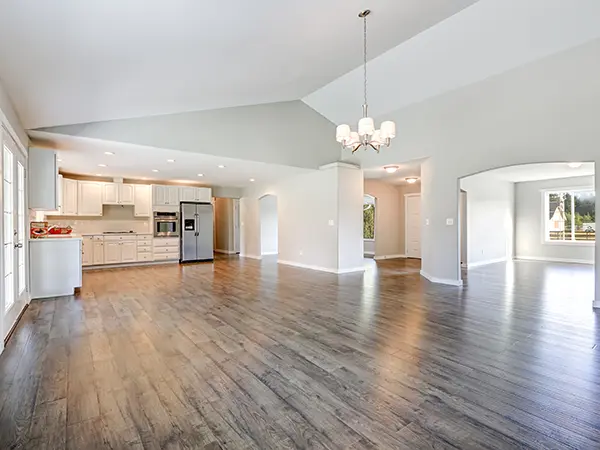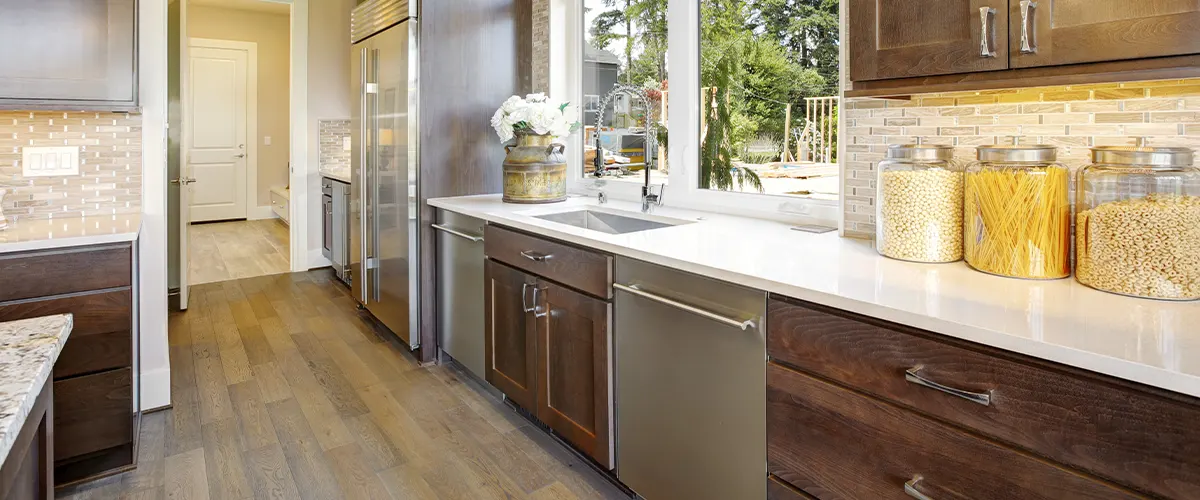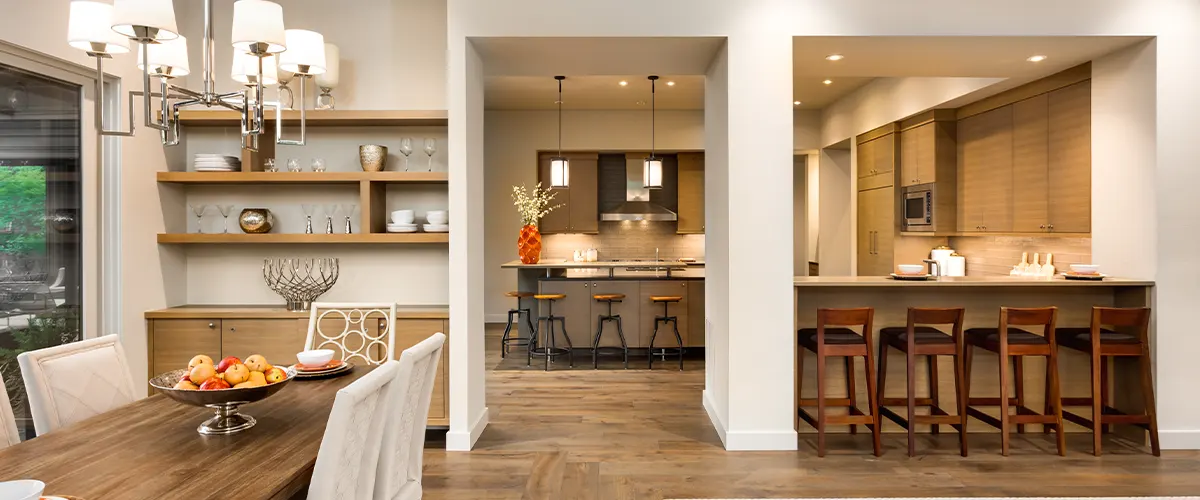Laminate Flooring vs. Wood: A Comprehensive Comparison
When it comes to choosing the perfect flooring for your home, the debate between laminate flooring and wood (hardwood flooring) often arises. Both options have their own set of advantages and disadvantages, which can make the decision challenging.
This blog post will delve into laminate flooring versus wood, focusing on aspects such as cost, durability, maintenance, and aesthetics to help you make an informed choice.


Hardwood Flooring: The Timeless Classic
Hardwood flooring, known for its natural beauty and durability, has been a popular choice for centuries. Hardwood floors bring warmth and elegance to any space, with a variety of options available, from solid hardwood flooring to engineered wood flooring.
The cost per square foot for hardwood can vary widely, depending on the type of wood and whether you opt for prefinished hardwood flooring or site-finished floors.
The appeal of real hardwood flooring lies in its uniqueness, with each plank offering distinct grain patterns and natural wood hues. Solid hardwood, in particular, can be refinished multiple times over its lifespan, allowing homeowners to refresh their floors every few years.
However, hardwood floors require regular maintenance to keep them looking their best, and they can be susceptible to scratches and moisture damage.
Laminate Flooring: The Practical Alternative
Laminate flooring has gained popularity as a cost-effective and durable alternative to hardwood floors. Made from composite wood pressed together at high temperatures, laminate floors are then covered with a photographic image of hardwood and a protective overlay.
This manufacturing process makes laminate flooring much more affordable per square foot compared to hardwood.
One of the key advantages of laminate flooring is its durability. The top layer provides resistance against scratches, dents, and stains, making it a suitable choice for high-traffic areas. Laminate floors are also easier to install, often featuring a click-lock system that allows for DIY installation.
However, while laminate can mimic the look of natural wood, it doesn’t have the same warmth or feel underfoot as solid hardwood.
Cost Comparison
When considering laminate versus wood, cost is a significant factor.
Laminate floors are generally more affordable, both in terms of the material cost per square foot and installation expenses.
Hardwood flooring, especially solid hardwood, can be more of an investment upfront, but adds more value to your home in the long run.
How to Know if a Floor is Hardwood or Laminate
Determining whether a floor is hardwood or laminate can sometimes be challenging, especially with high-quality laminate floors that closely mimic the look of real wood.
However, there are a few key indicators to help you distinguish between the two:
- Texture and Feel: Hardwood has a natural warmth and a solid feel underfoot, while laminate often feels slightly hollow and cooler. Running your hand over the surface may allow you to feel the grain and texture differences.
- Appearance of the Pattern: Hardwood floors have unique grain patterns and variations in each plank due to their natural origin. Laminate floors, however, often repeat patterns every few planks because they are manufactured from a photographic layer.
- Edges and Joints: Laminate planks typically have a more uniform and precise edge, with planks clicking together in a floating floor system. Hardwood floors may have slight irregularities at the edges and are often nailed or glued down.
- Sound: Walking on hardwood and laminate produces different sounds. Hardwood tends to have a more solid sound, while laminate can sound more hollow due to its floating installation and underlayment.

Best for Care and Cleaning: Tie
When it comes to ease of care and cleaning, both hardwood and laminate floors offer advantages, making it a tie between the two.
Hardwood Flooring requires regular sweeping or vacuuming to remove dirt and grit. It can be cleaned with a damp mop and a mild wood floor cleaner, but excessive water should be avoided to prevent damage.
Laminate Flooring also benefits from regular sweeping or vacuuming. It can be cleaned with a slightly damp mop or a laminate-specific cleaner. Laminate is more resistant to moisture on the surface, making spills easier to clean without the risk of water damage.
Both types of flooring should be kept away from excessive moisture and protected from scratches and wear with felt pads under furniture and by avoiding harsh cleaning tools.
Best for Water and Heat Resistance: Laminate
Laminate flooring takes the lead in water and heat resistance. Its construction includes a wear layer that provides protection against spills, stains, and fading, making it suitable for areas with higher moisture levels, like kitchens and bathrooms.
While not entirely waterproof, high-quality laminate flooring can withstand moisture better than hardwood.
In terms of heat resistance, laminate flooring doesn’t warp or expand as much as hardwood under temperature changes, making it a better choice for rooms with fluctuating temperatures or underfloor heating systems.
Best for Durability and Maintenance: Solid Hardwood
Solid hardwood flooring is renowned for its durability and the ability to be refinished multiple times throughout its lifespan.
This capability allows homeowners to sand down and refinish the surface to remove scratches, dents, and signs of wear, effectively renewing the floor’s appearance and extending its life for decades.
While laminate flooring is durable and resistant to scratches and wear, it cannot be sanded or refinished. Once the wear layer is damaged or worn through, the laminate planks will need to be replaced.
Therefore, in terms of long-term durability and ease of maintenance, solid hardwood flooring stands out as the superior choice.
Aesthetic Appeal
Aesthetically, hardwood floors offer unparalleled elegance and a timeless appeal that can enhance the look of any room. The natural variations in wood grain and color add character and depth to your space.
Laminate flooring, while it can closely resemble hardwood, may not capture the same richness and texture of real wood.
Environmental Considerations
For those concerned about sustainability, hardwood and laminate flooring present different considerations.
Solid hardwood flooring is made from natural wood, which is a renewable resource, but it requires more energy to produce.
Laminate flooring, made from composite wood, utilizes fewer natural resources but is not as easily recyclable as hardwood.
Installation Process
Most laminate floors come with a click-lock design that allows planks to easily snap together, making it possible for homeowners to install their own flooring without the need for glue or nails.
This can significantly reduce the installation cost per square foot.
Hardwood floors, on the other hand, generally require professional installation, especially for solid hardwood.
The installation process can be more complex, involving nails or glue, and may require sanding and finishing if opting for site-finished hardwood. Engineered wood flooring, while somewhat easier to install than solid hardwood, often still benefits from professional installation. This added labor cost can make hardwood flooring more expensive upfront compared to laminate.
Comfort and Sound
Another factor to consider in the laminate versus wood debate is comfort and sound insulation. Hardwood floors are known for their warmth and natural feel underfoot, contributing to a comfortable and inviting atmosphere in a home. Additionally, hardwood can improve a room’s acoustics by reducing echo and noise levels.
Laminate floors, while durable and visually appealing, may not offer the same level of comfort. The hard surface can feel colder and harder underfoot, which might be a drawback for some homeowners.
However, installing a quality underlayment beneath the laminate can improve both comfort and sound insulation, making laminate floors feel softer and reducing noise transmission.
Resale Value
When considering the long-term investment of flooring materials, the impact on your home’s resale value is crucial. Hardwood floors are often viewed as a premium flooring option that can increase the value of a home.
Many buyers appreciate the natural beauty and durability of hardwood and may be willing to pay more for a home with solid hardwood flooring. Engineered wood flooring also adds value, though perhaps not as much as solid hardwood.
Laminate flooring, while cost-effective and aesthetically pleasing, typically does not add as much to a home’s resale value as hardwood.
However, high-quality laminate floors that closely mimic the look of real wood can still be appealing to buyers, especially if the flooring is in good condition and suits the style of the home.

Make The Right Decision For Your Home
In conclusion, when it comes to choosing between laminate flooring and hardwood flooring, each option offers unique benefits that cater to different needs, preferences, and budgets. Laminate floors provide affordability, durability, and low maintenance, making them ideal for busy households and high-traffic areas.
On the other hand, hardwood floors exude unparalleled natural beauty, longevity, and the potential to enhance your home’s value over time. By carefully considering factors such as cost, durability, maintenance, aesthetics, and environmental impact, you can make an informed decision that aligns with your lifestyle and elevates your living space.
Regardless of your choice, both laminate and hardwood floors can significantly enhance the appearance and comfort of your home in Virginia, ensuring long-lasting enjoyment for years to come.
